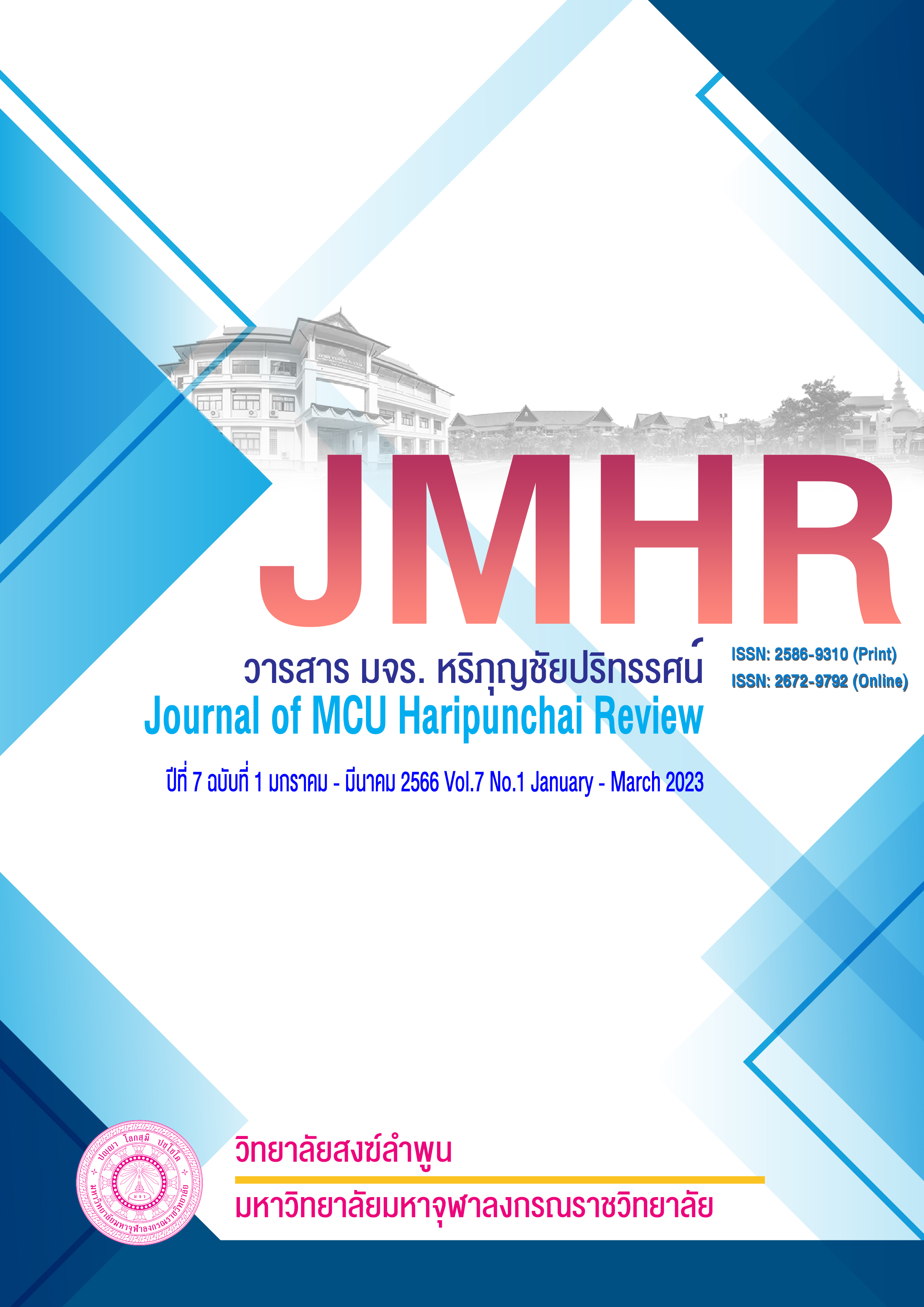Creating happiness Creating happiness for the elderly with Buddhist principles
Main Article Content
Abstract
This dissertation is of 3 objectives: 1) to study the Buddhist principles in cultivating happiness for the elderly; 2) to investigate the cultivationg happiness by the Buddhist principles towards the elderly in Nam Bo Luang Sub-district, San Pa Tong District, Chiang Mai Province, 3) to offer the integrative guidelines in happiness cultivation towards the elderly by Buddhist principles; a case study of the elderlies in Nam Bo Luang Subdistrict, San Pa Tong District, Chiang Mai Province. It is a qualitative research. Its results were found that : 1) On the Buddhist principles in cultivating happiness for the elderly, the happiness is a state of sufferingless. Being happy will bring about to a person, the being refreshed, sound minded, cheerful, enable to engage activities that are beneficial to themselves and society. The Buddhist principles in cultivating happiness are as follows: Three Characteristics, the Four Noble Truths, Sin and Merit/Kamma, the Four Foundations of Mindfulness, the Five Precepts and Virtues, and the Four Sublime States of Mind. 2) On the cultivating happiness by the Buddhist principles, it was found that in the elderly's happy life living, it is to make the elderly being peaceful, not anxious undisturbed, relaxed, smooth, free, airy, light, not clinging, not meen, open, sheding affection, good wishes to all fellow human beings and animals, having acknowledged the suffering of others with loving kindness, cheerful joining with perseverance in the happiness and prosperity of everyone's success and 3) On the integrative guidelines in happiness cultivationg towards the elderly by Buddhist principles, it was found that, firstly the eldery's concepts or attitudes should be adjusted, it is to think positively and have the optimistic view. The next one is the implementation to participate in activities by devoting oneself to be useful towards oneself and the others. These activities should be thoghtfully performed according to the above mentioned principles. From the survey results derived from the integrative cultivating happiness with Buddhist principles in all 7 items had got an overall average of 3.817, at a high level. The implied that this guideline is effective.
Article Details

This work is licensed under a Creative Commons Attribution-NonCommercial-NoDerivatives 4.0 International License.
References
ขวัญสุดา บุญทศ และ ขนิษฐา นันทบุตร. (2559). “ความสุข ความทุกข์ และสุขภาพจิตในบริบทของผู้สูงอายุ
ในชุมชนแห่งหนึ่งในภาคเหนือตอนบน ประเทศไทย”. รายงานการวิจัย. มหาวิทยาลัยขอนแก่น.
พระครูสิงห์แก้ว วชิรธมฺโม. (2554). "บทบาทของผู้สูงอายุในการส่งเสริมกิจกรรมทางพระพุทธศาสนา : ศึกษา
เฉพาะกรณีตำบลเหล่ายาว อำเภอบ้านโฮ่ง จังหวัดลำพูน". วิทยานิพนธ์พุทธศาสตรมหาบัณฑิต.
บัณฑิตวิทยาลัย : มหาวิทยาลัยมหาจุฬาลงกรณราชวิทยาลัย.
พระมหาเชาวฤทธิ์ นรินฺโท (ทรัพย์สวัสดิ์). (2561). "การศึกษาแนวทางการพัฒนาคุณภาพชีวิตผู้สูงอายุตาม
หลักภาวนา 4 : กรณีศึกษาผู้สูงอายุบ้านห้วยหอย ตำบลธาตุทอง อำภอภูเขียว จังหวัดชัยภูมิ". วิทยานิพนธ์พุทธศาสตรดุษฎีบัณฑิต. บัณฑิตวิทยาลัย : มหาวิทยาลัยมหาจุฬาลงกรณราชวิทยาลัย.
สำนักงาน ก.พ. "ภาครัฐกับการเตรียมความพร้อมเข้าสู่สังคมสูงวัย". วารสารข้าราชการ. 60 (4), 7.
สำนักงานคณะกรรมการพัฒนาการเศรษฐกิจและสังคมแห่งชาติ. (2561). รายงานวิเคราะห์การเปลี่ยนแปลง
โครงสร้างประชากรและผลกระทบที่เกิดขึ้นต่อการพัฒนาประเทศ. กรุงเทพมหานคร : สำนักงานคณะกรรมการพัฒนาการเศรษฐกิจและสังคมแห่งชาติ.
สุทธิชัย จิตุพันธ์กุล. ชัยยศ คุณานุสนธิ์. วิพุธ พูลเจริญ. ไพบูลย์ สุริยะวงศ์ไพศาล. (2542). ปัญหาสุขภาพ
ผู้สูงอายุไทย. กรุงเทพมหานคร : สถาบันวิจัยสาธารณสุขไทย มูลนิธิสาธารณสุขแห่งชาติ และสำนักนโยบายและแผนสาธารณสุข กระทรวงสาธารณสุข.
องค์การบริหารตำบลน้ำบ่อหลวง. (2563). ประกาศ องค์การบริหารตำบลน้ำบ่อหลวง เรื่อง บัญชีรายชื่อผู้มี
สิทธิรับเงินเบี้ยยังชีพผู้สูงอายุขององค์การบริหารตำบลน้ำบ่อหลวง ประจำปีงบประมาณ พ.ศ. 2563 อ.สันป่าตอง จ.เชียงใหม่. เชียงใหม่ : องค์การบริหารตำบลน้ำบ่อหลวง อ.สันป่าตอง จ.เชียงใหม่.
อังศุมาลย์ บุณยวาณิชย์กุล. "การประยุกต์ใช้หลักพุทธธรรมในชีวิตประจำวันของผู้สูงวัยบ้านธรรมปกรณ์
อำเภอเมือง จังหวัดเชียงใหม่". วิทยานิพนธ์พุทธศาสตรมหาบัณฑิต. บัณฑิตวิทยาลัย : มหาวิทยาลัยมหาจุฬาลงกรณราชวิทยาลัย.
อัจฉรา ปุร. (2563). “นโยบายกิจกรรมทางกายในผู้สูงอายุ การทบทวนวรรณกรรอย่างเป็นระบบ”. วารสาร
วิจัยระบบสาธารณสุข. 14 (6), 208.
อาภรณ์ ชีวะเกรียงไกร. (01 มิถุนายน 2560). ผลกระทบของสังคมผู้สูงอายุของประเทศไทย. [ออนไลน์].
แหล่งที่มา: https://www.bangkokbiznews.com/blogs/columnist/116354 [15 มีนาคม 2564].
อุดมพร 'ชั้นไพบูลย์. (2549). สังคมวิทยาเกี่ยวกับการสูงวัย. กรุงเทพมหานคร : สำนักพิมพ์มหาวิทยาลัย
รามคำแหง.


